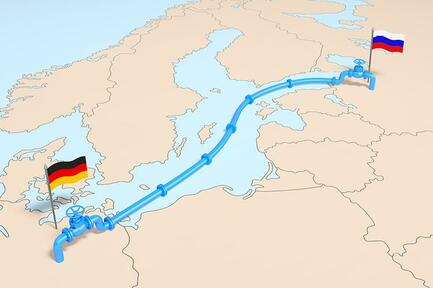On self-sufficiency – Patricia Cohen in NYT:
‘The snarled supply lines and shortfalls caused by the pandemic created a wide awareness of these vulnerabilities. Now, the invasion has delivered a bracing new spur to governments in Europe and elsewhere to reassess how to balance the desire for efficiency and growth with the need for self-sufficiency and national security.
And it is calling into question a tenet of liberal capitalism — that shared economic interests help prevent military conflicts.’
(…)
‘Since the disintegration of the Soviet Union three decades ago, the idea that economic ties can help prevent conflict has partly guided the policies toward Russia by Germany, Italy and several other European nations.
Today, Russia is the world’s largest exporter of oil and wheat. The European Union was its biggest trading partner, receiving 40 percent of its natural gas, 25 percent of its oil and a hefty portion of its coal from Russia. Russia also supplies other countries with raw materials like palladium, titanium, neon and aluminum that are used in everything from semiconductors to car manufacturing.
Just last summer, Russian, British, French and German gas companies completed a decade-long, $11 billion project to build a direct pipeline, Nord Stream 2, that was awaiting approval from a German regulator. But Germany halted certification of the pipeline after Russia recognized two separatist regions in Ukraine.
From the start, part of Germany’s argument for the pipeline — the second to connect Russia and Germany — was that it would more closely align Russia’s interests with Europe’s. Germany also built its climate policy around Russian oil and gas, assuming it would provide energy as Germany developed more renewable sources and closed its nuclear power plants.’
(…)
‘Philippe Martin, the dean of the School of Public Affairs at SciencesPo in Paris, said that the 2014 agreement between Ukraine and the European Union may have marked a turning point for Russia. “That translated into more trade with the E.U. and less with Russa,” he said.
Mr. Martin has written skeptically that economic ties promote peace, arguing that countries open to global trade can be less worried about picking a fight with a single nation because they have diverse trading partners.
In the case of Russia’s march toward Kyiv, though, he offered two possible explanations. One is that no one — including the European leaders who imposed them — expected such crippling sanctions.
“I think that Putin miscalculated and was surprised by the harshness of the sanctions,” Mr. Martin said. “The second interpretation is that Putin does not care” about the impact that sanctions are having on the welfare of most Russians.
Which does he think is correct? “I think both interpretations are valid,” he said.’
Read the article here.
Mr. Martin is right. Both interpretations are valid.
A shared economic interest is not a panacea. War is always an option. Not too long the idea existed that a country where you had a McDonald's would never go to war with a country where McDonald's was also based. Well, no.
Self-sufficiency might sound reasonable. You cannot blackmail us into obedience because we don’t need your energy, your wheat, your technology etc.
Think of viruses or climate. Is there anyone who really believes that there is a way out of interdependency?
The idea that lack of trade between countries is good for peace seems to be far-fetched to me.
Also, less trade is less prosperity. Russian economy is not exactly flourishing. Precisely because of the lack of openness, the corruption, the bureaucracy.
Eternal peace is not yet within reach, but trade is the better alternative for war and bloodshed.
